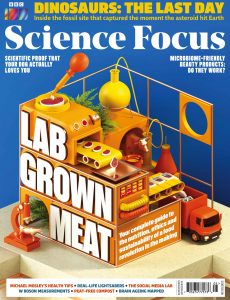
BBC Science Focus – May 2022
English | 94 pages | pdf | 84.13 MB
FROM THE EDITOR
Our attitude to meat and dairy in the UK is evolving, and you only have to visit a local supermarket to see it. Alongside the meat and dairy aisles, now sit shelves crammed full of plantbased alternatives. There are juicy burgers made out of pea proteins, chicken nuggets made from mushrooms and crispy bacon made from tofu. And if there was any doubt, the world’s biggest fast-food chains all now serve some form of plant-based alternative to their trademark burgers. The public wants to eat less meat, but it doesn’t want to cut out its favourite foods – especially not the ones that are quick and easy to cook.
What’s driving the change? Of course, many have long chosen meat-free diets because they can’t stomach modern farming practices. But more recently, it seems as though consumers are coming to terms with the effect their appetite has on the environment. As well as being good for your health, cutting down on the amount of meat you eat is one of the most powerful personal changes you can make to reduce your carbon footprint. All of the above point to one conclusion: there’s money to be made if someone can faithfully recreate meat, without the need for livestock farming. Biotech companies around the globe have spotted this opportunity and now the race is on. Indeed, in some parts of the world you can already buy a plate of meat that’s been grown in a bioreactor, rather than on a farm. It’s just a matter of time before slaughter-free alternatives make it to our shop shelves. To discover what we know so far about ‘cultivated meat’, head to p54.
Daniel Bennett, Editor
Download from: